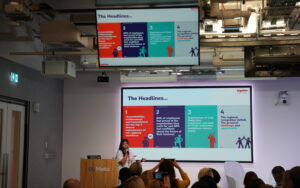Gen Z’s entry into the workforce has changed workplace culture, prioritizing aspects like work-life balance, autonomy, flexibility, and incentives.
Many also prioritize a sense of purpose and fulfillment regarding their work. According to Deloitte’s 2024 Gen Z and Millennial survey, 86% of Gen Z say it is very or somewhat important to their overall job satisfaction and well-being.
Boomers and older generations, on the other hand, pursue a more traditional and linear career, prioritizing productivity, even to the point of overworking. As younger generations start to take over in the workplace, tensions rise, especially when Gen Z assumes leadership roles and begins to shape the culture of their organizations.
WORK STYLE DIFFERENCES
Sarah ElAshmawy, the culture consultant at together, says baby boomers and Gen Z have “radically different relationships with the workplace.”
She explains that baby boomers’ core belief about work is commitment; their experience with the workplace is built on a sense of meritocracy and the belief that if they work hard, they will be rewarded.
On the other hand, Gen Z, a generation that has gone through the growing pains of multiple economic crises and the takeover of tech and AI, feels that they are a disposable resource to their companies, whether through mass layoffs witnessed in the economic crises or automation waves. Hence, one of their core values is “balance,” they take great pride in being open about their boundaries and needs.
“This distinction is important as it impacts the core of the relationship with all workplace elements including management relationships, discretionary effort and willingness to leave,” AlAshmawy.
She references together’s work across the region, noting that Gen Z expects fairness, the right tools to achieve their goals, transparency around performance evaluation, and evolving compensation and benefits packages to match their economic reality.
“In contrast, boomers will take great pride in staying loyal to one company throughout their employment. This desire for stability and strong loyalty often leads to boomers prioritizing productivity and output, even if they lack the resources,” she adds.




